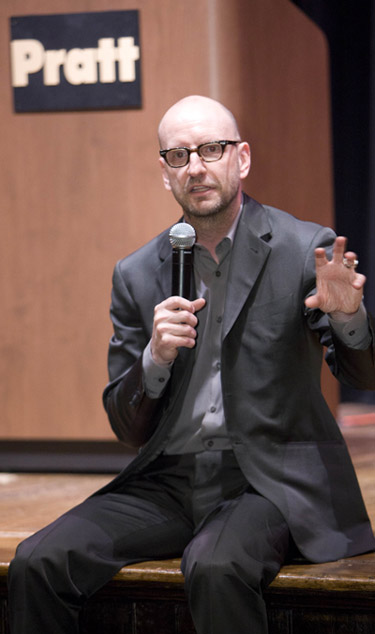Filmmaker Steven Soderbergh Delivers President’s Lecture
 Steven SoderberghAcademy-award winning director and producer Steven Soderbergh offered a range of advice to aspiring Pratt filmmakers at the 19th annual President’s Lecture Series last month, then took more than a dozen questions from students eager to know the secret to Soderbergh’s decades’-long success.
Steven SoderberghAcademy-award winning director and producer Steven Soderbergh offered a range of advice to aspiring Pratt filmmakers at the 19th annual President’s Lecture Series last month, then took more than a dozen questions from students eager to know the secret to Soderbergh’s decades’-long success.
From the stage at Memorial Hall, Soderbergh urged an audience of more than 200 students to assess situations and make quick decisions; to watch every movie possible; to remain observers of human nature; and to be willing to go anywhere to shoot a scene.
Soderbergh, who received an honorary degree at Pratt’s 2010 commencement, told students that the ability to absorb information and make quick yet effective decisions can make or break a director.
“Art to me is really about problem solving. The word I would use is ‘filtering.’ What you’re trying to do is imagine and anticipate all the parallel possible versions of what you're doing… And how you filter and how quickly you filter … it's going to be probably the difference between you accomplishing what you want to accomplish or not.”
He also told students he believes a key to his success is his ability to be “the man on the bus,” which he has achieved by limiting media access to him so he remains relatively anonymous.
“There are certain filmmakers [who] I can see in their work the result of never, for the last several decades, having been anywhere where everyone in the room doesn’t know who they are. It really does have an effect. You see it in the performances, because all they have to compare it to is being in rooms where they’re kings.”
Soderbergh ran through a list of tips—some specific to filmmaking, such as “you should know the difference between a scene and a sequence,” and some more universal such as “write everything down. Don’t fool yourself into thinking you’ll remember that excellent idea later.” He also handed around a list of films, books, and plays he had read and watched over the last month, an eclectic blend that included, among many other things, contemporary short stories and Alfred Hitchcock movies.
He then said all his tips and advice boiled down to one question: "What is art for exactly? I guess the answer is that I know that in the moment in experiencing a piece of art you’re not alone. You’re being addressed by another human being, you’re connected to another human being, often in a way that transcends description, especially a linguistic description. And I guess because I believe that, I want in that moment for that person to feel like I gave it everything that I had. I feel like I owe them that, I feel like we owe each other that.”
Soderbergh then took questions from the audience, sitting on the edge of the stage to field questions on everything from the latest filmmaking technology to what he might do if he retires from filmmaking.
He said he had been answering this question recently, saying “I’m not improving in the ways that I think will result in me making something as extraordinary as I think things ought to be or as extraordinary as things that I’ve seen. I have run out of things to try. What I want is to find something else to do that makes me 17 years old again. That I then have, if necessary, multiple decades of work to do to get good at that. That is more exciting to me than trying to grind down the last little corner of what I can figure out over the next 20 years and make stuff that I feel like I’ve made before.”
Photo: René Perez

 Gateway Editors
Gateway Editors
Reader Comments (1)